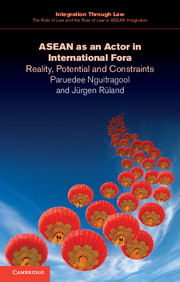Book contents
- Frontmatter
- Contents
- List of tables
- General editor's preface
- Acknowledgements
- List of abbreviations
- 1 Introduction
- 2 Analytical framework: a cognitive approach of externalization
- 3 ASEAN's cognitive prior and negotiating capacities
- 4 ASEAN as a negotiator in global fora: stages of negotiation
- 5 ASEAN as an actor in global fora: negotiation strategies
- 6 Case studies
- 7 Conclusions and future options
- Executive summary
- References
- Index
4 - ASEAN as a negotiator in global fora: stages of negotiation
Published online by Cambridge University Press: 05 May 2015
- Frontmatter
- Contents
- List of tables
- General editor's preface
- Acknowledgements
- List of abbreviations
- 1 Introduction
- 2 Analytical framework: a cognitive approach of externalization
- 3 ASEAN's cognitive prior and negotiating capacities
- 4 ASEAN as a negotiator in global fora: stages of negotiation
- 5 ASEAN as an actor in global fora: negotiation strategies
- 6 Case studies
- 7 Conclusions and future options
- Executive summary
- References
- Index
Summary
In Chapter 3 we explored the internal dimension of ASEAN's collective action capacities in global fora. Our analysis revealed that, as predicted in the theoretical section, member countries' historical experiences have given rise to institutional arrangements that are not very conducive for building common knowledge-based negotiation positions in international fora. In this chapter we change the perspective and examine the external dimension. That is, ASEAN's practices as a negotiator in global fora. In this regard, we investigate how cohesively ASEAN operates in international organizations such as the UN and the WTO. Commensurate with the theoretical concept outlined in Chapter 2, we try to establish the type of cohesion that characterizes ASEAN activities in global fora and ask how ASEAN or individual ASEAN member countries act at different stages of negotiation processes. To what extent are they initiators and agenda-setters, to what extent does ASEAN or its member countries act as norm entrepreneurs, how do they act in voting and how do they comply with decisions?
With the findings of Chapter 3 as a starting point, we expect ASEAN mainly to be operating as a caucus in international forums. Member countries share an essentially skeptical outlook on the external world, distrust still lingers among them despite nearly five decades of cooperation, some regional identity has developed but is still clearly secondary to national identity, power sensitivity still strongly guides the behavior of member states and epistemic capacities are mediocre and distributed inequitably among the membership. As a result, we anticipate that ASEAN member states will frequently defect from collective action: in fact, whenever it suits their national interest.
Phase 1 identifying problems, defining issues and agenda-setting
While ASEAN as a regional organization has been a frequent agenda-setter in the Asia-Pacific region, this is less obvious for its global activities. In global fora its record as initiator, innovator and agenda-setter has been rather ambiguous.
- Type
- Chapter
- Information
- ASEAN as an Actor in International ForaReality, Potential and Constraints, pp. 92 - 133Publisher: Cambridge University PressPrint publication year: 2015



